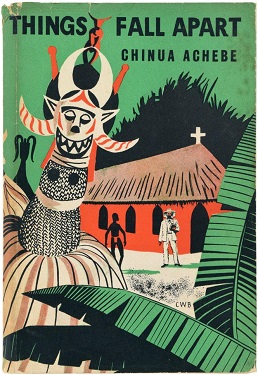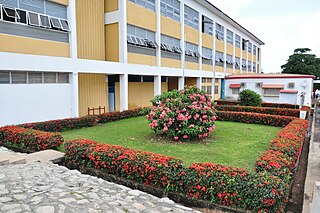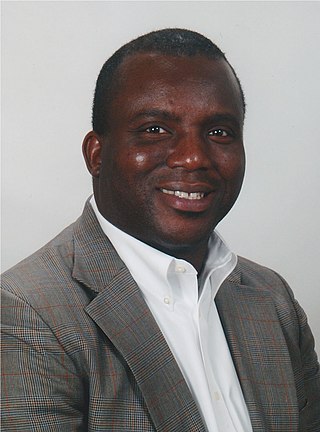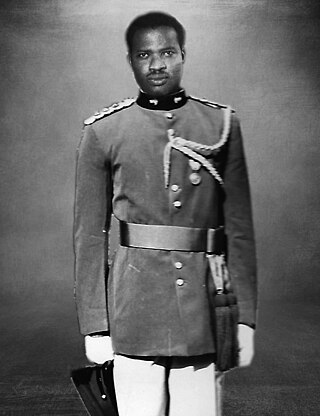Contents
| Part of a series on |
| Nigerians |
|---|
 |
| List of Nigerians |
| Part of a series on |
| Nigerians |
|---|
 |
| List of Nigerians |

Chinua Achebe was a Nigerian novelist, poet, and critic who is regarded as a central figure of modern African literature. His first novel and magnum opus, Things Fall Apart (1958), occupies a pivotal place in African literature and remains the most widely studied, translated, and read African novel. Along with Things Fall Apart, his No Longer at Ease (1960) and Arrow of God (1964) complete the "African Trilogy". Later novels include A Man of the People (1966) and Anthills of the Savannah (1987). In the West, Achebe is often referred to as the "father of African literature", although he vigorously rejected the characterization.

Things Fall Apart is the debut novel by Nigerian author Chinua Achebe. It portrays the life of Okonkwo, a traditional influential leader of the fictional Igbo clan, Umuofia. He is a feared warrior and a local wrestling champion who opposes colonialism and the early Christian missionaries. Published in 1958 by William Heinemann Ltd, the novel gained critical acclaim and popularity, and has been translated into fifty languages.

Muhammadu Bello was the first Caliph of Sokoto and reigned from 1817 until 1837. He was also an active writer of history, poetry, and Islamic studies. He was the son and primary aide to Usman dan Fodio, the founder of the Sokoto Caliphate and the first caliph. During his reign, he encouraged the spread of Islam throughout the region, increasing education for both men and women, and the establishment of Islamic courts. He died on October 25, 1837, and was succeeded by his brother Abu Bakr Atiku and then his son, Aliyu Babba.

Nigerian literature may be roughly defined as the literary writing by citizens of the nation of Nigeria for Nigerian readers, addressing Nigerian issues. This encompasses writers in a number of languages, including not only English but Igbo, Urhobo, Yoruba, and in the northern part of the county Hausa and Nupe. More broadly, it includes British Nigerians, Nigerian Americans and other members of the African diaspora.

The Association of Nigerian Authors (ANA) is a non-profit organization that promotes Nigerian literature. It represents Nigerian creative writers at home and abroad. It was founded in 1981 by Nigerian novelist Chinua Achebe as its president. The immediate past President is Alhaji Denja Abdullahi. The incumbent president is Camilus Ukah and the Vice President is Hajiya Farida Mohammed.

Arrow of God, published in 1964, is the third novel by Chinua Achebe. Along with Things Fall Apart and No Longer at Ease, it is considered part of The African Trilogy, sharing similar settings and themes. The novel centres on Ezeulu, the chief priest of several Igbo villages in colonial Nigeria, who confronts colonial powers and Christian missionaries in the 1920s. The novel was published as part of the influential Heinemann African Writers Series.
A Man of the People is a novel by Nigerian writer Chinua Achebe. Written as a satirical piece, "A Man of the People" follows the story told by Odili, a young and educated narrator, about his conflict with Chief Nanga, his former teacher who enters a career in politics in an unnamed fictional 20th-century African country. Odili represents the changing younger generation, while Nanga represents the traditional West African customs inspired by Achebe's native Nigeria. The book ends with a military coup, similar to the real-life coup organized by Major Chukwuma Kaduna Nzeogwu, Major Adewale Ademoyega, Major Emmanuel Ifeajuna, Captain Chris Anuforo, Major Donatus Okafor, and Major Humphrey Chukwuka.

The International School Ibadan (ISI) is located on the Campus of the University of Ibadan, Nigeria's oldest university.

Chidi Chike Achebe is a Nigerian-American physician executive. He is currently the chairman and CEO of AIDE. AIDE is a Boston-based organization dedicated to the development of the African continent. Dr. Achebe has also served as the president and CEO of Harvard Street Neighborhood Health Center, Medical Director of Whittier Street Health Center and as assistant professor at Tufts University School of Medicine– all in Boston, Massachusetts. Achebe also serves as medical consultant; Clean water for kids – an NGO that brings fresh water to underserved communities in Liberia; and advisor for Tesfa Health, Bahirdar, Ethiopia.
The Torodbe; singular Torodo were Muslim Toucouleur clerics and theocratic monarchs who preached and reigned in Futa Toro, a region located in the north of present-day Senegal, and other Fula communities in West Africa from at least the seventeenth to the early twentieth century. Drawn from all ethnicites and levels of society, the Torodbe aimed to 'purify' the Islam practiced in West Africa and establish Islamic states run with Islamic law.

Ejike Ebenezer Obumneme Aghanya was a military officer and electrical engineer who served in the Nigerian Army and the Biafran Armed Forces, retiring as a colonel. Accused of involvement in the 1966 Nigerian coup d'état he was arrested and imprisoned without trial until the outbreak of the Nigerian Civil War where he served on the side of Biafra, holding key positions in the Biafran Armed Forces. He was the head of the Biafran Agency for Research and Production (RAP) which produced bombs, rockets, missiles, as well as ammunition, armored vehicles, telecommunication gadgets and petroleum refineries among others for the Biafran Armed Forces. Later he was the Chief of Staff of the Biafran Organisation of Freedom Fighters (BOFF) which was the guerrilla warfare and special operations arm of the Biafran Armed Forces. He also served as Battalion Commander, 44th Electrical and Mechanical Engineer Battalion Biafran Army and later Brigade Commander of the 58th Brigade of 12th Infantry Division Biafran Army during the war.

Princess on a Hill is a 2024 Showmax original Nigerian drama. Chuka Ejorh, Folashayo Oke-Sobo, Tolu Ajayi, and Abiola Sobo executively produced the television series, created by Abiola Sobo, and Tolu Ajayi. The television series starring Norbert Young, Efa Iwara, Ireti Doyle, Femi Jacobs, Onyinye Odokoro, Bimbo Manuel, Andrew Yaw Bunting, and Mimi Chaka, as main cast.

The first season of the Showmax Original television drama series Princess on a Hill, premiered on 7 November 2024. The series was created by Abiola Sobo, and Tolu Ajayi, and produced by Folashayo Oke-Sobo. Chuka Ejorh, Folashayo Oke-Sobo, Tolu Ajayi, and Abiola Sobo served as the series' executive producers for Blink Studios, Suss Productions, and Saga City, starring Norbert Young, Efa Iwara, Ireti Doyle, Femi Jacobs, Onyinye Odokoro, Bimbo Manuel, Andrew Yaw Bunting, and Mimi Chaka.